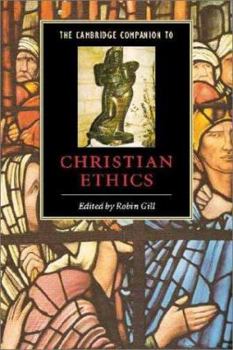The Cambridge Companion to Christian Ethics
(Part of the Cambridge Companions to Religion Series)
Select Format
Select Condition 
Book Overview
In this second edition of the best-selling Cambridge Companion to Christian Ethics, Robin Gill brings together twenty essays by leading experts, to provide a comprehensive introduction to Christian... This description may be from another edition of this product.
Format:Paperback
Language:English
ISBN:0521779189
ISBN13:9780521779180
Release Date:January 2001
Publisher:Cambridge University Press
Length:306 Pages
Weight:1.15 lbs.
Dimensions:0.8" x 6.0" x 9.0"
Customer Reviews
2 ratings
Excellent Survey
Published by Thriftbooks.com User , 19 years ago
This book is a very good survey of the breadth of issues in Christian Ethics and the Christian moral life, with insight into the possible responses that many Christian thinkers have given to those issues. The book includes conservative and liberal views, and gives a good try at objective survey of these views using the thoughts and theories of respected Christian scholars. A trusted source and trusted publisher.
A good introduction to Christian ethics
Published by Thriftbooks.com User , 21 years ago
By and large, the essays in this volume are well-researched, well-written, and tightly argued. The book is divided into three sections: a preliminary one that interprets the relationship between faith, scripture, and ethics; a middle one that explores various traditions in Christian ethics; and a final one that offers treatments of specific moral issues. The first part is the most satisfying of the three. Rowan Williams' lead essay, "Making Moral Decisions," masterfully argues that Christians make moral decisions pretty much the same as everyone else, except (and this is a big "except") for the fact that the decisions are made within the context of a community of faith and reflect that community's worldview. This means that the Christian should also seek to exemplify divine holiness in her moral decisions, and that she should take seriously disagreements in the community that also strive for such an exemplification. The other essays in the first section take their cue from Williams' approach, carefully examining whether scripture is a set of definitive moral guidelines or whether it instead is an interpretive tool that invites contemporary readers to examine the issues confronting them in light of the Gospel message. The latter approach is endorsed.The middle section discusses several traditions including natural law ethics and virtue ethics, but for my money Lisa Sowle Cahill's essay on gender and Tim Gorringe's on liberation are the most interesting. They're also the most unsatisfying, because space constraints prevent Cahill and Gorringe from providing more than sketchy overviews. The third section is the most uneven part of the book. R. John Elford offers a rather uncritical endorsement of just war theory, thankfully offset by Robin Gill's reasoned but passionate argument that the arms trade is unacceptable from a Christian moral perspective. Max Stackhouse's essay is a strangely heavy-handed endorsement of neoliberal capitalism, but is balanced to some extent by Duncan Forrester's more reflective essay on social justice and welfare. Michael Northcott's essay on ecology is quite good, but Don Browning's on world family trends is overblown--one of his basic contentions is the (surely eurocentric) claim that father-less families are devastating in their consequences--and James Childress' on biomedical issues is a rather ho-hum rehash of standard issues revolving around abortion, euthanasia, and reproduction.One interesting note: the influence of Stanley Hauerwas is evident throughout the essays in this volume. There are more references to him than to any other Christian ethicist-- including Thomas Aquinas, Augustine, Karl Barth, Martin Luther, and St. Paul!






